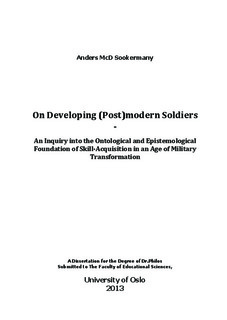| dc.description.abstract | This thesis (on the development of (post)modern soldiers) is a theoretical inquiry into the ontological and epistemological basis of skill-acquisition in an age of military transformation. As such, it deals with the comprehensive restructuring of the armed forces that has taken place in developed Western countries in the aftermath of the Cold War era, and its implications on the development of soldiering skills. Quite briefly, one can describe the transformative shift as a change from a large static invasion defense-based concept built on “civilian” conscripted volume-concerned mobilization forces with little more than basic skills, towards a smaller and more flexible expeditionary force-based defense concept dependent on ability-motivated professional military groups and units with well-developed “expert” skills. Within the academic literature, this shift is interpreted as being one of paradigmatic character which resembles the societal change of worldview from modernity (with its association to universalism, structure and objectivity) towards postmodernity (and its responsiveness to contextuality, complexity and constructivity). Therefore, from a pedagogical philosophical standpoint, this dissertation is, in essence, concerned with the development of soldiers in a transformational era from modernity towards postmodernity. Consequently, the main research question is formulated as being ‘How do we develop (post)modern soldiers?’ In driving the process three intriguingly simple yet essentially meaningful sub-questions have been put forward: 1) ‘How do we understand [military] skill?’ 2) ‘What is it to be [militarily] skilled?’ and 3) ‘How do we acquire [military] skills?’ In addressing the ontological and epistemological level of military skill-acquisition in this context, three aspects are investigated more closely; namely identity (as change in the being of a soldier), skill (as change in military conduct/soldiering) and learning (as change in how to become a soldier). The inquiry into the conception of identity implies a shift from a classic dualistic view of the human body where the mental and the physical are separated, towards a holistic view of human nature in which being a human [soldier] is expressed through an embodied presence in the world. Likewise, the investigation into the understanding of skill suggests a move from a universalist epistemology where (modern) skills are seen as being constituted of rules and maxims, towards a contextualistic understanding in which (postmodern) skill is expressed through action, judgment, valuation and assessment. And finally, the exploration of learning signals a change from scholastic instructional principles fostered in educational institutions, towards a non-scholastic learning style (observation, copying, participation etc.) situated in the everyday practice of the workplace/community of practice. When summarizing the main findings in this thesis it is implied that the implications of the military transformation, in regards to military skill-acquisition, propose a shift from a detached ontology, context-free epistemology and theoretical learning paradigm, towards an embodied ontology, situated epistemology and experiential learning paradigm. | nb_NO |
| dc.relation.haspart | Doktoravhandlingen består av tre artikler og en kappe. En av artiklene er ikke tilgjengelig i Brage på grunn av opphavsrettigheter.
Artikkel I
Sookermany, A. (2011). The embodied soldier: Towards a new epistemological foundation of soldiering skills in the (post) modernized Norwegian Armed Forces. Armed Forces & Society , 37(3). The published version is available at http://dx.doi.org/10.1177/0095327X10372594
Artikkel II
Sookermany, A. (2012). What is a skillful soldier? An epistemological foundation for understanding military skill acquisition in (post) modernized armed forces. Armed Forces & Society, 38(4). The published version is also available at: http://dx.doi/10.1177/0095327X11418320
Artikkel III: Ikke tilgjengelig i Brage:
Sookermany, A. (2012). Learning in doing - Skills acquisition in (post) modernised military communities of practice. Defence studies, 11(4) http://dx.doi.org/10.1080/14702436.2011.642195 | |
